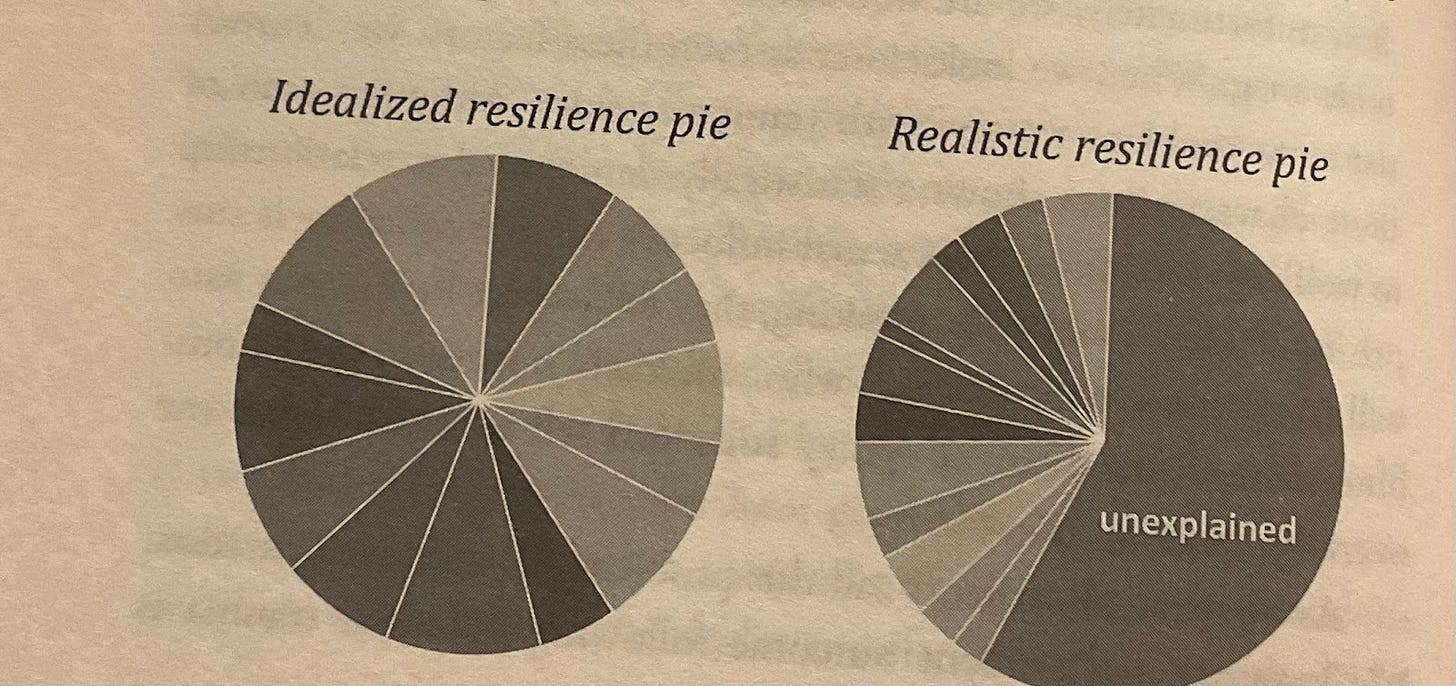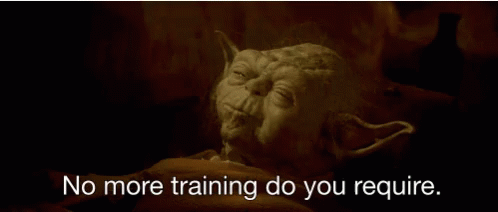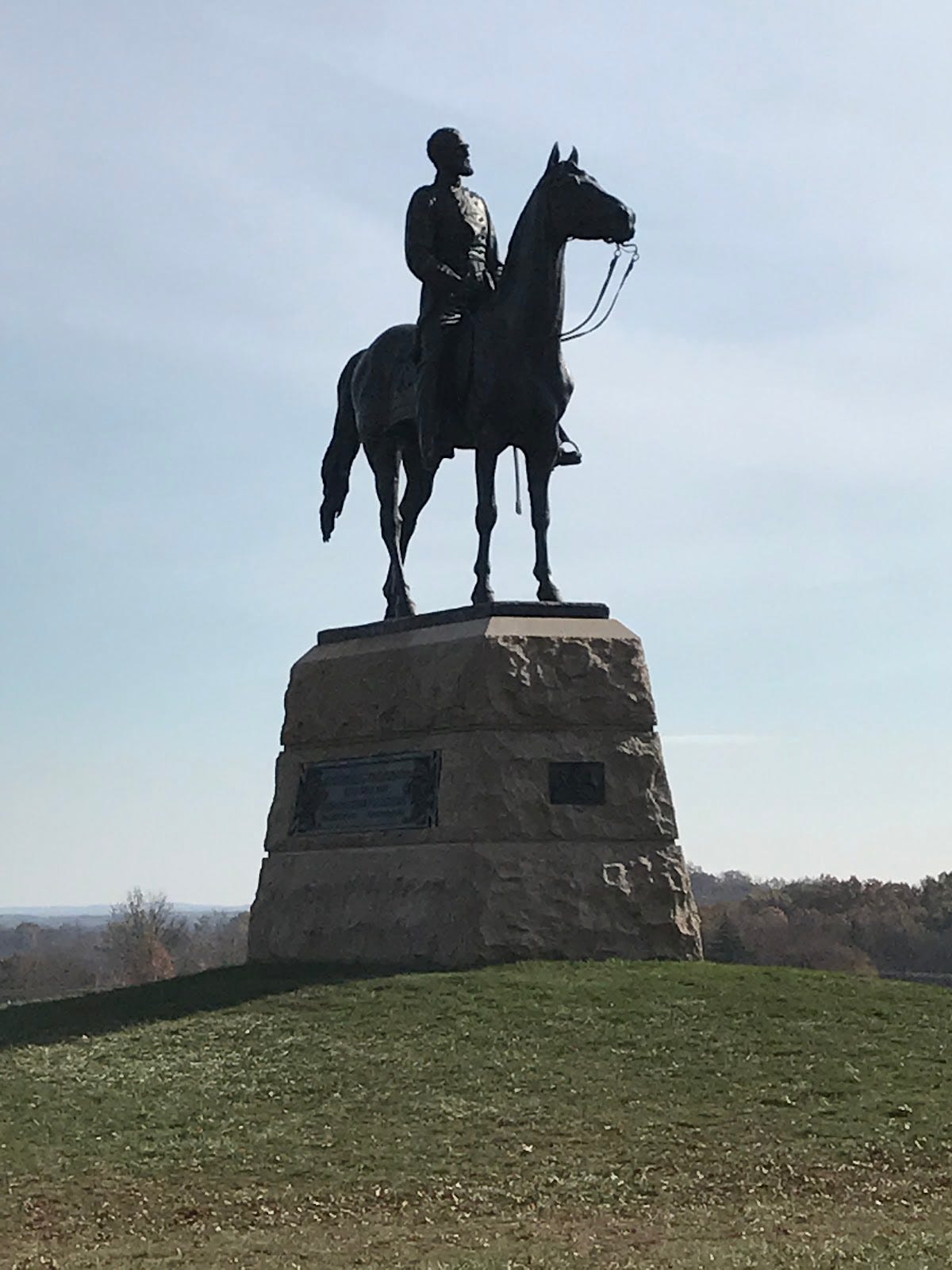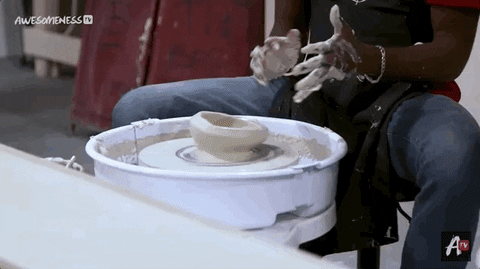#22: The resilience experiment.
If you can learn from “failure” without self-judgment, you can be resilient.
Free & paid subscribers receive the exact same weekly content in their inboxes every Saturday morning. (The newsletter, vulnerable, personal, embarrassing stories, book recommendations, and whatever gifs have made me giggle.)
Considering upgrading to help myself and my editor Leona dedicate more time to The Luminist and support our current non-profit of choice: Experience Camps for grieving kids.
Hello readers! I’ve been traveling and working like crazy and delinquent on comment-responses, but hoping to have some space to chat with you all this weekend. While I’ve had my nose buried in a computer screen, spring snuck in and sprung in Northern Virginia. Here’s a peek at its radiant dailiness — a carpet of bluebells along the Potomac at Great Falls Park:
On the day Mike died, I had visitors.
I don’t mean family, who gathered together in mutual consolation. I don’t mean close friends, who gave us space. I mean… acquaintances. People in our solar system but not our immediate orbit.
A mom we knew from the kids’ school showed up ashen-faced and jittery in my driveway. I happened to be in the garage, collecting myself in a private moment.
Seeing me, she rushed forward, grabbing my arm.
“Sue! I’m so sorry. I could never do this… what you are doing right now. I would never survive.”
I was too lost in the fog of shock to think of anything polite or strategic to say. All I could manage was honesty.
“You’d be surprised what you’re capable of.”
I probably would have thought the same thing in her shoes.
Whether it is one of our brains’ nonsensical defense mechanisms or a culturally-inherited belief, most of us are convinced that surviving our worst tragedies isn’t a sure thing. You can tell because the “lucky ones” end up hosting talk shows where the rest of us convene to learn their secrets of survival.
Not surprisingly, according to someone who actually studies loss and trauma, science doesn’t support this narrative.
I read Dr. George Bonanno's first book — The Other Side of Sadness — with a ferocious intensity. I was an airplane crash survivor wandering the desert, despairing that I’d never find water… and this book quenched my thirst. Its premise was simple and life-giving: grieving is natural and normal, and so is recovering.
Along with some unexpected words from a close friend, this book gave me permission to set my sights not just on surviving, but on thriving.
In 2022, Bonanno came out with a broader and deeper discussion of resilience in his next book, The End of Trauma. I dove into it head first, no longer as a wretch dying of thirst, but as a crusader, galvanized to learn the secrets of resilience, healing, prospering, and vibrant living.
In this book, Bonanno re-writes the above-mentioned narrative that “adverse experiences” cripple many of us, while also debunking common coping myths, including:
brushing trauma aside
the suck-it-up-buttercup method
smearing it with a thick coat of toxic positivity, spiritual bypassing, or “what doesn’t kill you makes you stronger”
you either have the resilience gene or you don’t — like red hair or actually being fine with five hours a sleep a night
Rather, Bonanno democratizes resilience. We can all learn it.
Bonanno asserts that having a flexibility mindset (optimism about the future, confidence in your ability to cope, and a willingness to think about threats as challenges) gives us a conviction that says, “I will find a way to deal with this challenge.”
This mindset then allows us to grieve, process, hibernate, cope, curse the heavens however we need to when hardship hits… while simultaneously knowing that we will make it to the other side.
Or as my friend says, “I have survived 100% of my toughest days so far. I will get through this one too.”
Around two-thirds of us will have a “resilience trajectory,” as Bonanno puts it.
We survive our adverse event and move ahead. (In a related subject close to my heart, 83% of deployed military members show a resilience trajectory according to one study Bonanno references. And surprisingly, 81% after combat.)
If we are good at practicing self-care, self-nurturing, self-compassion, self-respect… if we are curious, joyful, optimistic, hopeful, patient, spiritual, then we are resilient… right? Not quite.
Here one of our favorite Luminist concepts comes in — paradox. Bonanno says that these are all great qualities to have, and they contribute some to resilience, but surprisingly, not more than 50%
Huh?

Bonanno’s research suggests that the flexibility mindset turns into resilience when taken to the next level… Aka put into action.
It’s not just what you have! It’s how you use it ;).
This happens when we take our healing into our own hands — testing what works and what doesn’t — without getting discouraged and giving up.
We try a coping skill.
We feel like 100%, certified, grade-A crap.
We scrap it and try a different coping skill.
We don’t attach the "failure" to our identity. The coping strategy was not a good match for this moment (or "context” as Bonanno puts it). We did an experiment and learned something from it. Now we will do another.
Turns out it’s not you. It’s your coping mechanism.
Because I’m a girl who learns by example (and assumes everyone else does too), let me share a few of my own with you.
Netflix suppression & distraction.
In the first year of mourning when I hit overload, my coping strategy was a stiff drink (discreetly poured out of the kids’ sight) and a Star Wars mini-marathon. It gave me a respite from the swirling anxiety and dread of the unknown and endless well of missing Mike… just for a little bit.
As I’ve described in a previous post, part of processing loss is allowing time for restoration. Like how winter makes way for spring. We need to shut down for a bit, letting our minds and our souls reset. Apparently Chewbacca’s ululations were my ticket to that mindless peace. Consistently, I would zone back in during the closing credits of Return of the Jedi feeling more anchored to the present moment, rather than lost in pain of the past or fear of the future.
So even though I am a flag-waving member of the Feel Your Feelings! Club, my Star Wars cocktail hours were a surprisingly successful coping mechanism. Now, if that had turned into an every-evening endeavor instead of a few Fridays a month, or made me feel worse when I came back to reality, I would have needed to re-assess.
Suppression and distraction worked for me in that moment.
As I gained strength and momentum in my healing process, I noticed that my once dear Yoda & vodka ritual didn’t have the same effect. I would come out feeling drained and dazed rather than grounded. So I moved on to other strategies.
The same strategy that works in one moment may not work in the next.
Context context context.
Battlefield perspective shift.
Along with successful coping moments, I had plenty of face-plants from coping choices gone wrong…
On the first anniversary of Mike’s death, I was torn between being active and chilling out. Honoring his loss in some grandiose way or pretending it wasn’t happening at all. Staying busy or staying prone.
I took the day off.
The kids wanted to go to school so I had until 3:30 to myself. It was too much freedom to not do some grand gesture. (I tend to default to go-big-or-go-home when a quiet afternoon reading by the fire would do.) After some thought, I decided to take the 90-minute drive to Gettysburg. Wouldn’t seeing our nation's most profound, bloody, history-pivoting battlefield memorial put death into perspective? My one death (Mike) vs tens of thousands?
I got the kids off to school, packed a lunch, poured coffee into my hydroflask, and headed north.
Straight out of the gate I found myself on a slippery slope. Seeing buses of white-haired senior citizens reminded me of all the ages Mike would never achieve… and the ages I would be without him. Next, the sheer volume of death reported in the exhibits felt both overwhelming and detached from the real, individual death my heart was still breaking over.
I headed outside to walk the battlefield and see the monuments in an attempt to salvage the day. Fresh air! Trees! These were some of my favorite bag-of-tricks coping mechanisms. I walked and walked and walked. Monument after monument, name after name. SO much death... Too much death to honor what each individual life had been, had meant. Mismatch.
Ok, enough. Time to abort.
I jumped in my car, did a Dukes-of-Hazard screech out of the bus-filled parking lot, and headed south. I pulled up Audible, seeking the relief of a tried and true coping strategy: listening to a memoir by a dad who lost his adult son. It worked. I took a shaky breath, feeling my blood pressure take a step back from the edge. I was back in my zone, back in my groove, back in what worked for me — individual, personal experiences. Not battlefield generals exhorting troops.
I made it home with plenty of time to greet the kids, give them a particularly tight hug, and make some mac-n-cheese before letting us all sink into sweet relief with SpongeBob.
Since that day I have embraced my loss in a thousand different ways and talked about death with just as many people. But embracing loss at the scope of Gettysburg was not a successful strategy for me. Not at that time in my journey.
Coping methods are inherently neither good nor bad.
Every strategy has costs and benefits. Effective strategies help us meet the challenge of the moment without costing too much of our time, life-force, or actual money. There is no rule book, playbook, song book, sketchbook, or comic book that lays out the exact successful strategy for every challenge. It is on us to read the context, experiment, and assess how it’s going.
Then, if it’s not working, to turn on a dime without self-judgment.
Which is all easier said than done, obviously. So we start experimenting, pivoting, practicing the “pause-and-reflect” sequence when the stakes are low:
What are your tried and true coping strategies that you turn to again and again?
Is there a coping mechanism that has been your go-to for awhile but is losing its effectiveness? (Do you continue to use it anyway?)
What is a coping mechanism (or two) you’d like to slip into your toolkit and start experimenting with?
Working the giant feedback loop of life, we refine our way forward over and over again.
In resilience,
Sue
P.S.
As I was writing the first draft of this post on Sunday afternoon, we had our own live-action resilience challenge here at Casa Deagle.
A boy Kendall had been hanging out with did her dirty. At first there was a lot of yelling and profanity directed at said boy. “Coping dirty” as Bonanno would say… but effectively! Then there was talking, pacing, crying, and screaming. Friends called with consolation. “That jerk! You are awesome, don’t let this turkey get you down.” Next, a good long walk in the trees of Great Falls Park, followed by some horse-hugging at a nearby barn.
Finally, there was some quiet wound-licking and hopeful words about the path ahead when we leave this boy behind and head to college. As you can imagine, Kendall has a lot of experience with the mindset + action + experimentation = resilience equation. Losing your dad at eleven gives you lots of practice at assessing context, selecting strategies, and adapting as your needs change.
And most of all, living in the mindset: “I’ve been through the worst and come out the other side, wise and fierce and still laughing and even more alive. I can do it again.”












Reading the other comments, congratulations on the WSJ coverage! Another great piece, Sue. Why do we put so much pressure on ourselves to do everything right, all the time? (And it's not just us, but others putting the pressure.) When I first saw Nerf on playgrounds I thought, "How horrible!" (Not a mom, but a former kid.) I thought children were being robbed of another chance to learn resilience, and part of resilience is learning not to fall again -- but knowing that, if you did, it will hurt, you will recover, there might be a scar, but so what? You'll be okay. Life is joy and pain intertwined. We have to learn to accept and appreciate that. And we need to learn how to support people when they are in the you-know-what (I really can't believe what that acquaintance said to you in the garage!!!). xo
Thanks for another thought-provoking article, Sue! I tend to find solace in energy work, so when things begin to feel a little "too much" in my world, I turn to practices like Reiki, Qigong, or yoga to help reorient me back to myself and my inner wisdom (as well as help calm my often overreactive nervous system!) :)